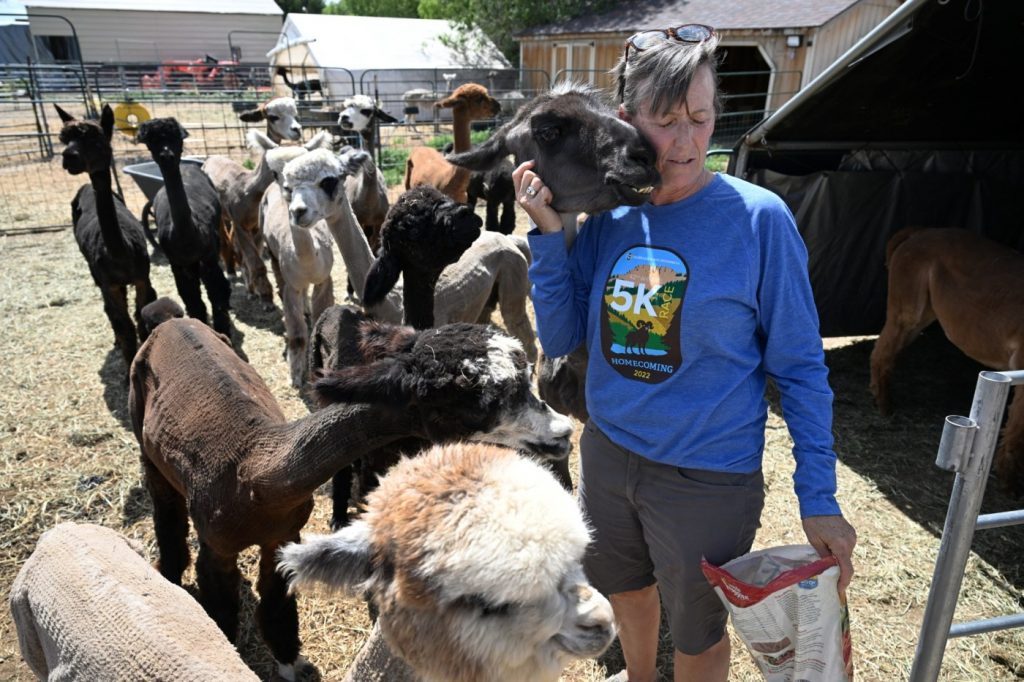Ann Danielson is expecting a steady stream of visitors this summer to her alpaca ranch southeast of Longmont. The ranch is one of roughly 120 small businesses in Colorado that open up their property overnight to people camping in recreational vehicles in exchange for a little patronage.
This will be the third summer that Danielson, co-owner of Annie’s Alpaca Ranch, has participated in the program by Harvest Hosts, a Colorado-based company that coordinates with businesses across the country, listing more than 5,000 sites as potential stopovers. Campers pay Harvest Hosts an annual membership fee and agree to buy something or contribute in some way to the wineries, breweries, farms, roadside attractions and other locations that provide space for travelers.
Danielson sells products made with alpaca fiber in a small store next to her house at the ranch.
A colorful stuffed Alpaca toy is availlable inside the store at Annie’s Alpaca Ranch in Longmont, Colorado on June 4, 2024. The Alpaca Farm also allows campers and those with RVs to camp overnight and learn more about the animals at the ranch. (Photo by Helen H. Richardson/The Denver Post)
“My first year, I didn’t have that many people. Last year, I had a lot and it’s starting to be a lot again this year,” Danielson said. “If i wanted, I could probably have somebody almost every day.”
Danielson uses an app to let people know when she’s willing to host campers and to keep in touch with guests about their arrival time, the kind of vehicle they’re driving and information about themselves.
Harvest Hosts has grown as more people are hitting the road. Travel by RV boomed in popularity during the COVID-19 pandemic when many avoided air travel and staying in hotels. More than 11 million households own RVs, up 62% from 2001, according to the RV Industry Association’s website.
Post-pandemic, higher interest rates have been a speed bump for the industry, with sales falling significantly since 2021, but remaining above pre-pandemic levels, Reuters reported. The RV Industry Association said the median age of a first-time buyer dropped to 32 in 2022, down from 41 in 2020.
Harvest Hosts owner Joel Holland is part of the younger demographic that discovered the RV life. Now 39, he and his wife left the Washington, D.C., area when he was 30 and toured the country by motor home for two years.
“I had built a video tech company and was completely burned out. I was sick and tired of cubicles, concrete jungles and driving to work in traffic,” Holland said. “My wife and I didn’t have kids yet. We impulsively purchased an RV and just hit the road. The idea was, ‘Let’s just do the great American road trip until we get sick of it.’”
The couple loved the “proverbial wind in your hair, freedom of the open road,” but didn’t always enjoy the campgrounds. “You’re parked 5 feet away from another RV. The campgrounds are nothing special,” Holland said.
Other campers told Holland about Harvest Hosts, then a mom-and-pop business in Arizona. After settling in Vail, Holland offered to buy the company. He invested heavily in technology to grow the network of sites from around 600 to a few thousand. The majority of his 20 employees are in Colorado.
Annual memberships for campers range from about $84 to $143. The higher level comes with access to more sites. Hosts don’t pay anything. The company said it does background checks on the hosts.
Campers aren’t charged fees, but they’re encouraged to patronize hosts’ stores, restaurants or wineries. Holland said businesses report averaging $13,000 in additional yearly revenue from the overnight guests.
Treat it like your grandmother’s property
One of Harvest Hosts’ code of conduct is to treat the sites “like it’s your grandmother’s property,” Holland said.
“And No. 2 is support the business you visit,” Holland said. “These locations are letting you stay for free. Otherwise you’d be paying quite a lot of money.”
Harvest Hosts checks with businesses to track how things are going. The experience for Valley View Christian Church in Douglas County has been positive, lead pastor Phillip Holland said.
“Harvest Hosts reached out to us a few years ago looking for a location. It looked like something that could be a benefit to our community and to those that are traveling,” Holland said. “It’s not easy to reserve locations to place your camper and RV and it’s incredibly expensive.”
People staying on the property, which is south of Highlands Ranch, often make donations to the church. If they’re around on a Sunday morning, they usually attend the service.
“We are very blessed with the property and the facility that we have available to us,” Holland said. “Monetarily it’s not moving the needle for us, but it does increase awareness of our ministry and to me that’s a great thing.”
Campers must have self-contained vehicles. The hosts don’t provide hook-ups or other services. The stays are intended to be just overnight.
A blog posted by Cruise America, which rents and sells RVs, said a Harvest Hosts membership can quickly pay for itself, considering that campgrounds typically charge $30 and more per night. There are a variety of sites “away from the hustle and bustle of traditional campgrounds.”
However, the blog advises that campers can’t show up at a Harvest Hosts location unannounced. And the campsite surfaces might vary: from concrete to asphalt to gravel, dirt or grass.
The site at Annie’s Alpaca Ranch is a mix of gravel and grass near Danielson’s house and the animals’ pens. She lets people know that her driveway can’t handle some of the bigger rigs.
Two Alpaca look out towards the farmhouse belonging to Annie Danielson, owner of Annie’s Alpaca Ranch in Longmont, Colorado on June 4, 2024. The Alpaca Farm also allows campers and those with RVs to camp overnight and learn more about the animals at the ranch. RVing got big during the pandemic and is still one of the most popular pastimes. Harvest Hosts is a Vail-based company that coordinates with local businesses willing to host overnight campers. The campers must be able to take care of all their own needs: water, bathrooms. Campers are encouraged to patronize the businesses in return for the overnight parking. Harvest Hosts estimates most campers spend about $50 per stay. Harvest Hosts coordinates with local businesses willing to provide overnight parking for RV travelers. (Photo by Helen H. Richardson/The Denver Post)
Many of Danielson’s guests like to mingle with the alpacas. Some will feed the animals grain pellets she puts out. The alpacas know that vans or RVs pulling up mean that treats are in store.
Danielson grew up on a cattle farm north of Ames, Iowa. She moved to the Denver area to work for an accounting firm, which closed in 2000. After visiting an alpaca farm and learning more about them, Danielson said she was “taken by the animals.”
Related Articles
Meghan Markle’s team says friend chose timing for controversial raspberry jam post
Too good to be true? What wearable technology can and can’t tell you about your heart health
Should you use a HELOC to pay your kid’s college tuition?
Single-family house sells in San Jose for $2.1 million
Gas prices expected to drop this summer
Danielson bought her first alpaca, which is smaller than a llama, in the summer of 2004 and bought the property near Longmont in December of that year. The herd has grown to 21 alpacas and two llamas, which ward off predators. She sells some of the fiber to a small mill in Utah and individuals and takes some of the animals to shows while still doing accounting work.
Based on her experience, Danielson said she would recommend the hosting gig to people who likes socializing. “I enjoy talking to people and knowing the story of where they’ve been, where they’re going.”


